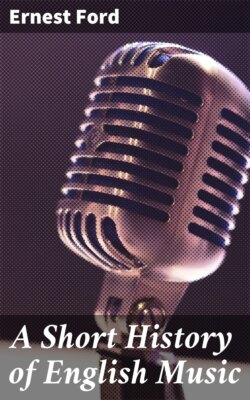Читать книгу A Short History of English Music - Ford Ernest - Страница 8
На сайте Литреса книга снята с продажи.
Оглавление"Mery sungen the muneches binnen Ely.
Tha Cnut ching reu therby:
Roweth, cnites, noer the land,
An here we thes muneches saeng."
This may be translated for the modern reader as follows:—
"Merry sang the monks of Ely,
As King Canute rowed by.
Row knights, near the land
And hear we these monks sing."
The music is, unfortunately, lost.
In Roman times a popular feature of the processions organised in honour of some newly-arrived conquering soldier was a band of dancers who, while gyrating in graceful movement, sang poems, reciting his heroic deeds.
The praise of heroes was, from the earliest, the dominant feature of the ballad, and, although far removed, as it must be from anything resembling even mediæval methods, the Greek and Roman form of it is most probably the real source from which it is derived.
There are many kinds of ballad known to England, but they are narrative, as a rule, such as "Chevy Chase," and many others of a similar style. Some are sad, some are gay; none are sentimental. One that can be seen in the Sloane Collection in the British Museum, "Joly Yankyn," is probably not much later than the one previously quoted. The name will recall Friar Tuck to the readers of Scott's "Ivanhoe."
A ballad that is believed to be of Eastern origin is the following:—
